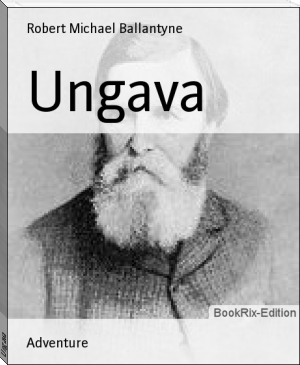Ungava - Robert Michael Ballantyne (distant reading txt) 📗

- Author: Robert Michael Ballantyne
Book online «Ungava - Robert Michael Ballantyne (distant reading txt) 📗». Author Robert Michael Ballantyne
At first the wolf did not seem inclined to retreat, but the shriek which Edith uttered on suddenly beholding the scene before her induced him to turn tail and fly. In another moment the terrified child sank exhausted on the snow beside the insensible form of Frank Morton.
CHAPTER TWENTY EIGHT.
EDITH BECOMES A HEROINE INDEED.
The shock which Edith received on beholding the bloodstained countenance of her companion completely paralysed her at first, but only for a few minutes.
The feeling of certainty that Frank would perish if assistance were not rendered tended to restore her scattered faculties, and nerve her heart for the duties now required of her; and she rose with a feeling of determination to save her companion or die beside him. Pour child! she little knew the extent of her own feebleness at that moment; but she breathed an inward prayer to Him who can, and often does, achieve the mightiest results by the feeblest means.
Raising Frank's head from the snow, she placed it in her lap, and with her handkerchief removed the blood from his forehead. In doing this she observed, to her inexpressible relief, that he breathed freely, and seemed rather to be in a state of stupor than insensibility. The place where he lay was a dark rent or split in the mountain, the precipices of which rose on either side to a height of between thirty and forty feet. The top of this chasm was entirely covered over with a crust of snow, through which there was a large gap immediately above the spot where Frank lay, revealing at once the cause of his present sad condition. He had evidently been crossing the ravine by means of the deceptive platform of snow, unaware of the danger of his position, and had been suddenly precipitated to the bottom. In descending, his head had struck the side of the cliff, which cut it severely; but the softness of the snow into which he fell saved him from further injury, except the stunning effect of the fall. How long he had lain in this state Edith had no means of knowing, but it must have been a considerable time, as Chimo could not have left him until after his fall. Fortunately the wolf had not touched him, and the wound in his head did not appear to be very deep. Observing that parts of his face were slightly frostbitten, Edith commenced to rub them vigorously, at the same time calling upon him in the most earnest tones to speak to her. The effect of this roused him a little. In a few minutes he opened his eyes, and gazed languidly into the child's face.
"Where am I, Eda?" he said faintly, while a gentle smile played about his lips.
"You are in the mountains, Frank. Dear Frank! do open your eyes again. I'm so glad to hear your voice! Are you better now?"
The sound of his voice attracted Chimo, who had long ago abandoned the pursuit of the wolf, and was seated beside his master. Rising, he placed his cold nose on Frank's cheek. The action seemed to rouse him to the recollection of recent events. Starting up on his knees, with an angry shout, Frank seized the gun that lay beside him and raised it as if to strike the dog; but he instantly let the weapon fall, and exclaiming, "Ah, Chimo, is it you, good dog?" he fell back again into the arms of his companion.
Edith wept bitterly for a few minutes, while she tried in vain to awaken her companion from his state of lethargy. At length she dried her tears hastily, and, rising, placed Frank's head on her warm cloak, which she wrapped round his face and shoulders. Then she felt his hands, which, though covered with thick leather mittens, were very cold. Making Chimo couch at his feet, so as to imbue them with some of his own warmth, she proceeded to rub his hands, and to squeeze and, as it were, shampoo his body all over, as vigorously as her strength enabled her. In a few minutes the effect of this was apparent. Frank raised himself on his elbow and gazed wildly round him.
"Surely I must have fallen. Where am I, Edith?" Gradually his faculties returned. "Edith, Edith!" he exclaimed, in a low, anxious voice, "I must get back to the igloo. I shall freeze here. Fasten the lines of my snowshoes, dear, and I will rise."
Edith did as she was desired, and immediately Frank made a violent effort and stood upright; but he swayed to and fro like a drunken man.
"Let me lean on your shoulder, dear Eda," he said in a faint voice. "My head is terribly confused. Lead me; I cannot see well."
The child placed his hand on her shoulder, and they went forward a few paces together--Edith bending beneath the heavy weight of her companion.
"Do I lean heavily?" said Frank, drawing his hand across his forehead. "Poor child!"
As he spoke he removed his hand from her shoulder; but the instant he did so, he staggered and fell with a deep groan.
"O Frank! dear Frank! why did you do that?" said Edith, anxiously. "You do not hurt me. I don't mind it. Do try to rise again."
Frank tried, and succeeded in walking in a sort of half-sleeping, half-waking condition for about a mile--stumbling as he went, and often unwittingly crushing his little guide to the ground. After this he fell once more, and could not again recover his upright position. Poor Edith now began to lose heart. The utter hopelessness of getting the wounded man to advance more than a few yards at a time, and her own gradually increasing weakness, induced the tears once more to start to her eyes. She observed, too, that Frank was sinking into that state of lethargy which is so dangerous in cold climates, and she had much difficulty in preventing him from falling into that sleep which, if indulged in, is indeed the sleep of death. By persevering, however, she succeeded in rousing him so far as to creep a short distance, now and then, on his hands and knees--sometimes to stagger a few paces forward; and at length, long after the cold moon had arisen on the scene, they reached the margin of the lake.
Here Frank became utterly powerless, and no exertion on the part of his companion could avail to rouse him. In this dilemma, Edith once more wrapped him in her warm cloak, and causing Chimo to lie at his feet, hastened over the ice towards the igloo. On arriving she lighted the lamp and heated the tea which she had made in the morning. This took at least a quarter of an hour to do, and during the interval she endeavoured to allay her impatience by packing up a few mouthfuls of pemmican and biscuit. Then she spread the deerskins out on the couch; and when this was done, the tea was thoroughly heated. The snow on the river being quite hard, she needed not to encumber herself with snow-shoes; but she fastened the traces of her own little sledge over her shoulders, and, with the kettle in her hand, ran as fast as her feet could carry her to the place where she had left Frank and Chimo, and found them lying exactly as they lay when she left them.
"Frank! Frank! here is some hot tea for you. Do try to take some."
But Frank did not move, so she had recourse to rubbing him again, and had soon the satisfaction of seeing him open his eyes. The instant he did so, she repeated her earnest entreaties that he would take some tea. In a few minutes he revived sufficiently to sit up and sip a little of the warm beverage. The effect was almost magical. The blood began to course more rapidly through his benumbed limbs, and in five minutes more he was able to sit up and talk to his companion.
"Now, Frank," said Edith, with an amount of decision that in other circumstances would have seemed quite laughable, "try to get on to my sled, and I'll help you. The igloo is near at hand now."
Frank obeyed almost mechanically, and creeping upon the sled with difficulty, he fell instantly into a profound sleep. Edith's chief anxiety was past now. Harnessing Chimo to the sled as well as she could, she ran on before, and a very few minutes brought them to the snow-hut. Here the work of rousing Frank had again to be accomplished; but the vigour which the warm tea had infused into his frame rendered it less difficult than heretofore, and soon afterwards Edith had the satisfaction of seeing her companion extended on his deerskin couch, under the sheltering roof of the igloo. Replenishing the lamp and closing the doorway with a slab of snow, she sat down to watch by his side. Chimo coiled himself quietly up at his feet; while Frank, under the influence of the grateful warmth, fell again into a deep slumber. As the night wore on, Edith's eyes became heavy, and she too, resting her head on the deerskins, slept till the lamp on the snow-shelf expired and left the hut and its inmates in total darkness.
Contrary to Edith's expectations, Frank was very little better when he awoke next day; but he was able to talk to her in a faint voice, and to relate how he had fallen over the cliff, and how afterwards he had to exert his failing powers in order to defend himself from a wolf. In all these conversations his mind seemed to wander a little, and it was evident that he had not recovered from the effects of the blow received on his head in the fall. For two days the child tended him with the affectionate tenderness of a sister, but as he seemed to grow worse instead of better, she became very uneasy, and pondered much in her mind what she should do. At last she formed a strange resolution. Supposing that Maximus must still be at the Esquimau village at the mouth of False River, and concluding hastily that this village could not be very far away, she determined to set out in search of it, believing that, if she found it, the Esquimau would convey her back to the igloo on the lake, and take Frank up to Fort Chimo, where he could be properly tended and receive medicine.
Freaks and fancies are peculiar to children, but the carrying of their freaks and fancies into effect is peculiar only to those who are precocious and daring in character. Such was Edith, and no sooner had she conceived the idea of attempting to find the Esquimau camp than she proceeded to put it in execution. Frank was in so depressed a condition that she thought it better not to disturb or annoy him by arousing him so as to get him to comprehend what she was about to do; so she was obliged to commune with herself, sometimes even in an audible tone, in default of any better counsellor. It is due to her to say that, in remembrance of her mother's advice, she sought the guidance of her heavenly Father.
Long and





Comments (0)